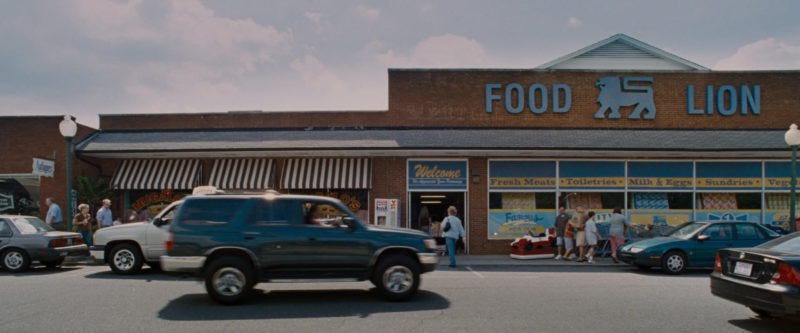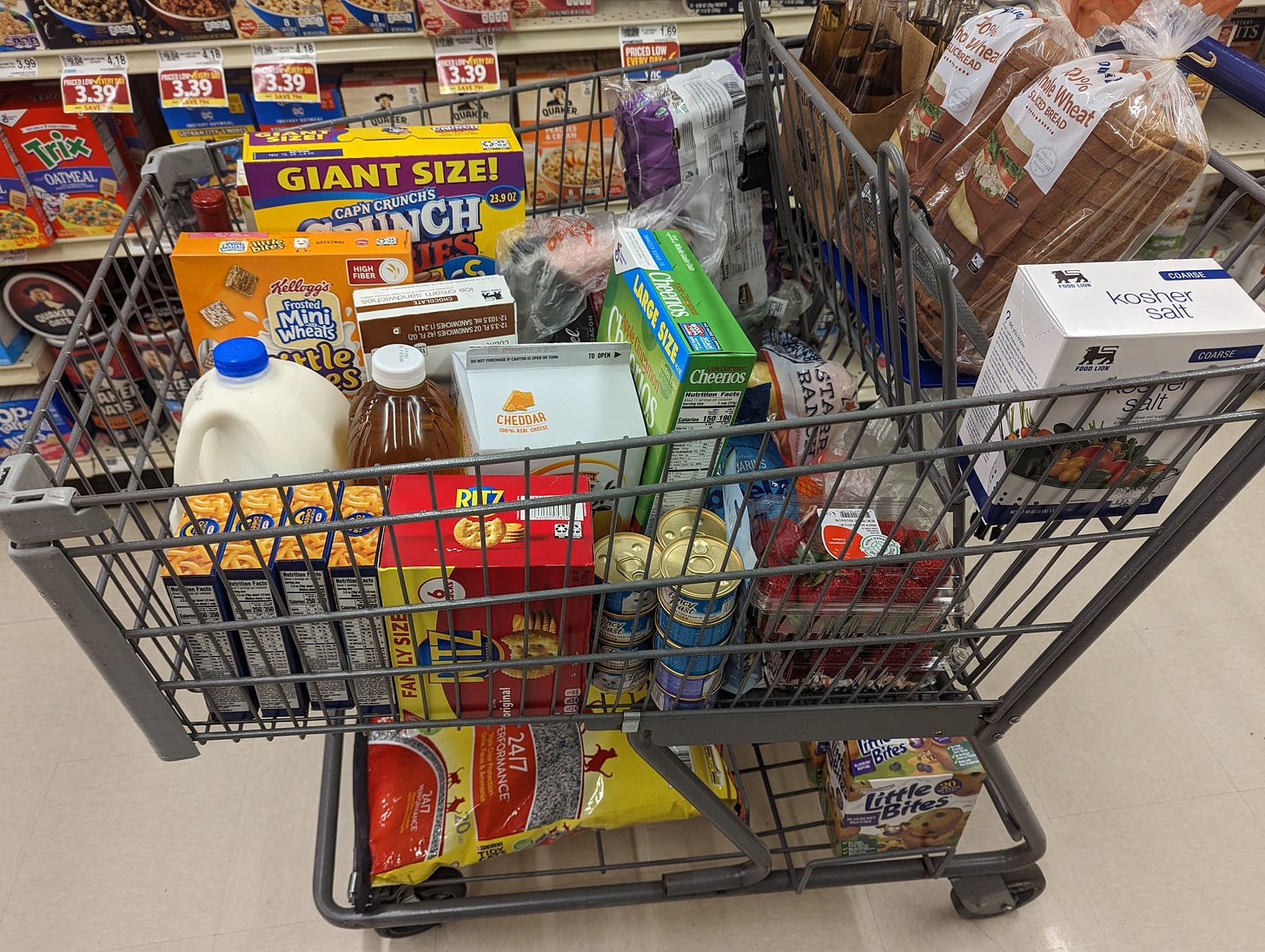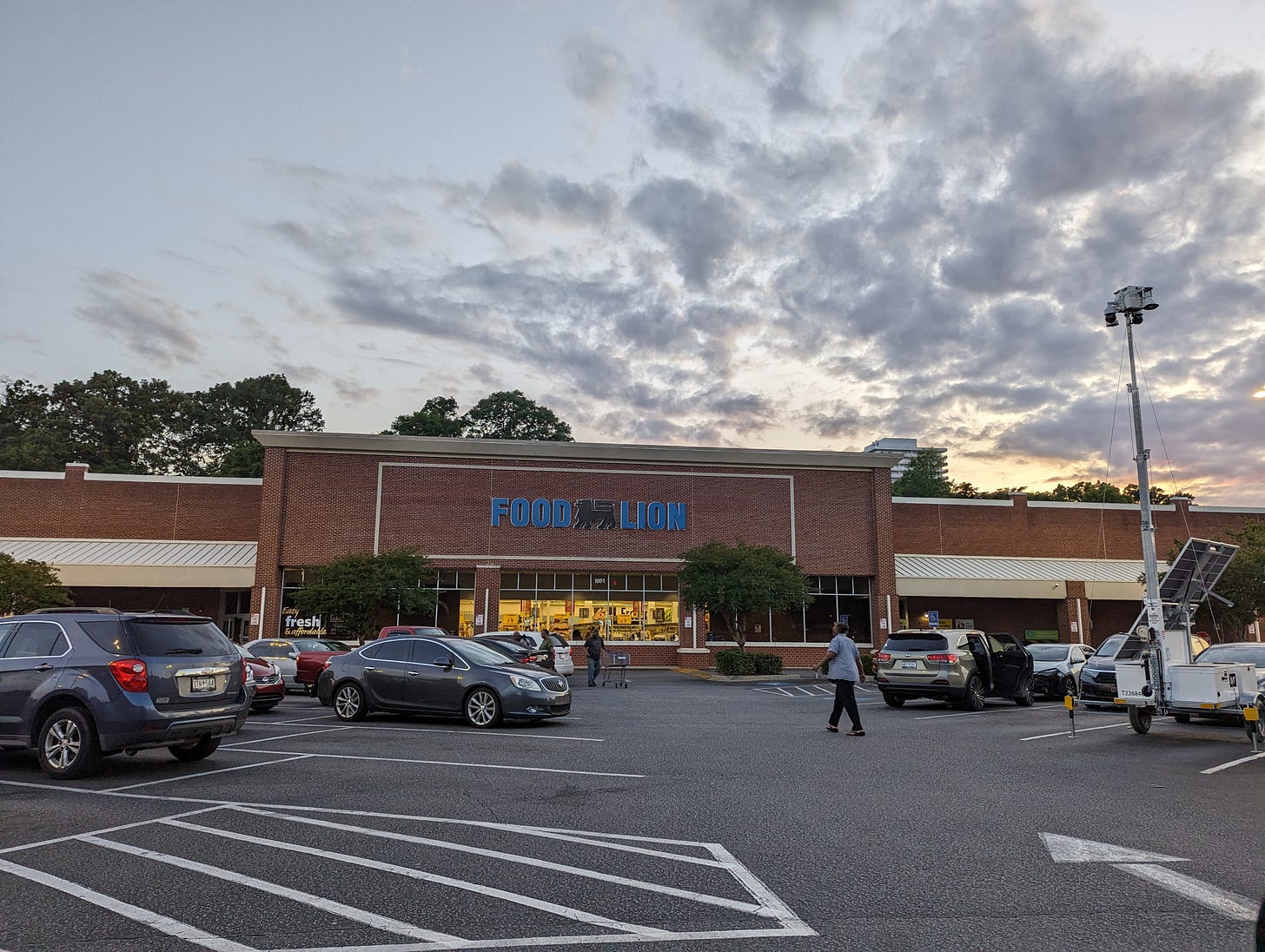Big Grocery is watching me
I requested my customer data from Food Lion and got some weird results
How to describe the pleasures of shopping at my local Food Lion? They carry the good, spicy ginger ale made right here in South Carolina. There is no self-checkout lane. My favorite cashier has shared tips with me on cooking with fish sauce.
For a store that lacks pretense and shuns the tech-forward approach of its competitors, Food Lion has a surprising secret: It knows a lot about me.
Or at least it thinks it knows a lot about me.
I recently got curious about the data grocery stores collect on their customers after reading an article in The Markup about the sophisticated surveillance and marketing operation at Kroger and Albertsons. The data-driven marketing efforts of those grocery chains (and their subsidiary brands like Ralph’s and King Soopers) are supposed to yield more than $1 billion in “profits opportunity” according to the stores’ recent merger filings.
I wanted to know what my grocery store knows about me. I’ve been shopping at Food Lion with my own “MVP” customer loyalty card since 2008, so I submitted a Right to Know request via Food Lion’s website1 and received an oddly revealing disclosure report.
Food Lion’s dossier on me includes 158 baskets’ worth of shopping data going back to February 2017, including dollar amounts and store locations. My wife and I spent $4,175.53 there over the course of the past year, and while our loyalty segment is listed as “tertiary” (as opposed to primary or secondary), our frequency is “average.” We buy a lot of vegetables, baking ingredients, and Asian food products, and very little meat, according to the report.
This all seems accurate. Food Lion seems to be making some inferences based on our shopping patterns. The company knows, for instance, that we have a pet in the household. This should be fairly obvious because I go there to buy wet food for our sweet toothless cat, Dolly Parton.
On the other hand, based on the disclosure report, it appears that Food Lion thinks we have no children in our home (we in fact have three kids). Our household income is listed as $15,000 a year (my wife and I each make considerably more than that), and my occupation is listed as “Sales/Marketing” (I’m a technical writer by day). Oh, and Food Lion thinks I’m a woman (I’m not).
Big Grocery is watching, in other words, but he’s not paying very close attention. You can read my personal disclosure report from Food Lion on DocumentCloud if you are interested.
In April, I sent a list of questions to Food Lion’s public relations email address. I know that companies like Food Lion will sometimes “enrich” their customer data with third-party data sets that can help make inferences about the race, finances, and online presence of customers like me. I wanted to know how Food Lion was making these inferences, how my data were being used and sold to third parties, and why their profile of me contained such wild inaccuracies.
In lieu of answers, I received a curt response from a corporate communications specialist:
“We at Food Lion understand the importance of privacy and take appropriate measures to safeguard the data of our customers. Our Privacy Policy is available for our customers to view our approach to privacy and the practices we have established to safeguard customer data.”
Friendly neighborhood data broker
In theory, Food Lion isn’t selling my personal data file, with my name attached to it, to any third parties. Instead, as I understand based on reporting about other grocers like Kroger, these data can help generate insights on the behavior of customers like me, a target demographic of moderately health-conscious parents in the suburbs. My data file gets de-identified before they share it with other companies, and Food Lion’s privacy policy page states that the company “will not attempt to re-identify the data unless permitted by applicable law.”
That’s in theory. In practice, large-scale data sets can be used to effectively re-identify customers whether the data broker intends it or not. One MIT study from 2015 looked at de-identified credit card metadata and found that, with just 4 purchase records, it was possible to uniquely re-identify 90% of the individuals from an anonymized set of 1.1 million people.2
According to my customer information disclosure report, Food Lion has 8 different Advertising IDs associated with me. These randomized strings of letters and numbers are in fact individually assigned, and are used by advertisers to microtarget us with ads across all of our apps and browsers.
I checked my mobile phone and my wife’s phone (both Androids), and two of the advertising IDs in the disclosure report corresponded with our phones. That’s a little spooky, given that neither of us are using the phone number I used to sign up for the MVP card, and neither of us has downloaded the Food Lion app or interacted with the company’s social media accounts. It’s troubling that Food Lion has obtained this information and won’t answer questions about what they’re doing with it, but it’s hardly surprising.

From the article in The Markup, I knew that grocery stores were making moves in the data marketing business. In Kroger’s case, the company created an entire data science subsidiary called 84.51° (named for the longitude of Kroger’s headquarters in Cincinnati). 84.51° claims to have more than 35 petabytes of first-party customer data, which is 7 times the amount of data collected via the Event Horizon Telescope to capture an image of a black hole.
The client list of 84.51° reportedly includes many of the companies that sell products in Kroger stores, like General Mills, Kraft, and Heinz. “The data 84.51° provides to them is used to understand not just what the sales figures are for a given product but also the context of the purchase—context that can only be understood with data about the shopper,” reporter Jon Keegan wrote for The Markup. The company has claimed it can provide insights on, for example, a shopper who gets recipes from Pinterest and a shopper who “shops the perimeter of the store to keep up with his healthy lifestyle.”
The closest thing Food Lion has to 84.51° is its in-house digital marketing agency, Peapod Digital Labs. According to an October 2022 article in Marketing Dive, Food Lion and Peapod’s parent company, the Dutch multinational retailer Ahold Delhaize, “is now eyeing deeper collaborations with CPG [consumer packaged goods] partners and running custom campaigns that leverage the grocer’s first-party data.” Details were hazy at the time, but they involved displaying more ads on screens in the store. Peapod has also been working with a company called Quotient Partners to send notifications to shoppers’ phones about temporary price reductions.
Unlike Kroger, Food Lion’s privacy policy does not mention using facial recognition technology on in-store surveillance cameras, tracking my exact location within the store. Unlike Kroger, I see no mention of Bluetooth beacons that ping my phone with personalized offers when I walk into a store.
Food Lion does, however, “automatically capture certain data from your device, such as device identifier and connection data” whenever I connect to free Wi-Fi in one of their stores. And if I use Food Lion’s website or app, my clicks, mouse movements, and scrolls may be tracked by a third-party company called Glassbox.
‘Tough Times?’
One of the questions I asked Food Lion’s PR team was about the third parties to whom the company sold or shared my data. They didn’t answer, so I tried making some inferences of my own.
On page 3 of my disclosure packet, I see something called a “Mosaic Household Description.” Turns out that phrase comes from Experian Marketing Services — yes, the same Experian that runs consumer credit reports.
I found a packet online3 listing Experian’s various household segments, from Power Elite (“predominantly white with a high rate of Asians”) to True Grit Americans (“down-to-earth, practical people who cultivate old-fashioned values”) to Urban Survivors (“They’re fond of gambling at casino tables and bingo halls”).
My household description is, apparently, Tough Times (“Older, lower income and ethnically diverse singles typically concentrated in inner-city apartments”). In a 2014 edition of the Mosaic USA E-Handbook, we even get this composite image of a Tough Times household. Meet Walter and Audrey:
I don’t know where they’re getting this stuff, but I can guess. My Food Lion is not in a wealthy neighborhood; most Food Lions are not. It sits at the border of Hanahan and North Charleston, the city where I live, which has one of the highest eviction rates in the country. The store is at the northern edge of what’s sometimes called a “food desert,” the part of my city where it’s difficult for people without cars to buy fresh produce. My friend Germaine Jenkins, who launched Fresh Future Farm to serve this end of town, refers to the policies that got us here as “food apartheid,” and I have to agree. Racist and classist zoning, combined with the razor-thin margins and risk-aversion models of supermarkets, create these deserts as a matter of policy.
So, Food Lion and Experian’s description of my household might be a crude guess based on the location of my grocery store. Or it might have to do with the way my wife and I shopped in college, living every week off of $50 or less of groceries at the Food Lion in Columbia’s Five Points (practically impossible now, I know). Maybe they know our kids go to a Title I school. Maybe it’s our frugality, although we’re not as frugal as we once were. I’m left guessing at this point.
Looking at the data Food Lion collected on my shopping trips all the way back in 2017, I remember money was tight back then, even with family graciously pitching in to help with childcare. My wife was working as a nurse and I was a newspaper reporter, and we had 3 kids under 3 years old. We were more tired than we had ever been. Someone who tracked all of our shopping over the time period since then could draw a sort-of-insightful portrait of our life and our slight upward mobility.
Our friendly multinational grocery conglomerate can glean a few facts about us: our love for carbohydrates, for example, or our kids’ weakness for Cap’n Crunch. But there are limits to this knowledge. They don’t really know us. Maybe it’s best that they don’t.
Twitter // Bandcamp // Spotify Podcasts // Apple Podcasts // Bookshop
If you’re a Food Lion customer with an MVP card, you can request your own data via Food Lion’s Privacy Portal. When filling out the form, under the question “What type of request would you like to submit?” select “Right to Know/Access.” The Right to Know comes from a Virginia state law, but apparently the company fulfills requests even for people who live outside the state.
De Montjoye, Y.-A., L. Radaelli, V. K. Singh, and A. Pentland. “Unique in the Shopping Mall: On the Reidentifiability of Credit Card Metadata.” Science 347, no. 6221 (January 29, 2015): 536–539. https://dspace.mit.edu/handle/1721.1/96321
Experian Marketing Services. “Mosaic® USA Group and Segment Descriptions.” (Version 2, 2013). PDF download link via Emory University Libraries.







extremely late to this (catching up on neglected Unreads in my inbox) but man, a lot of these Mosaic Household Groups would be fun band names- "Stockcards and State Parks", "Footloose and Family Free" jump out immediately.